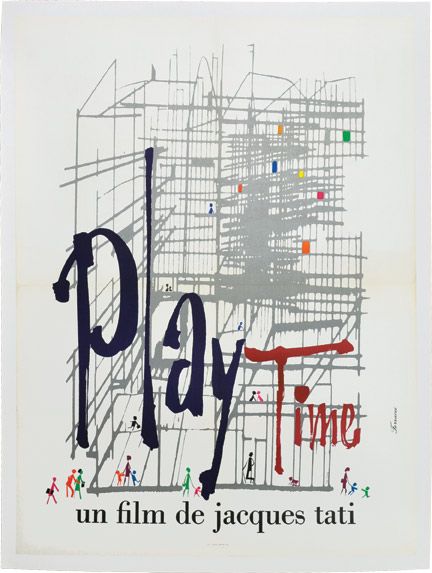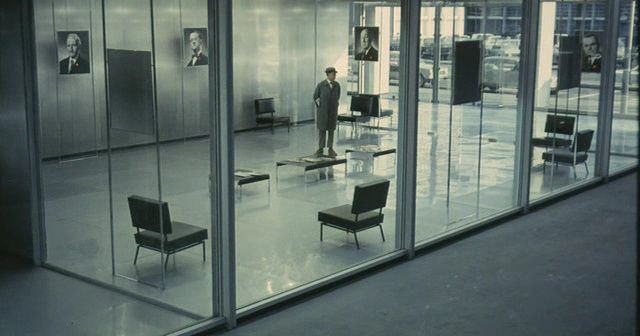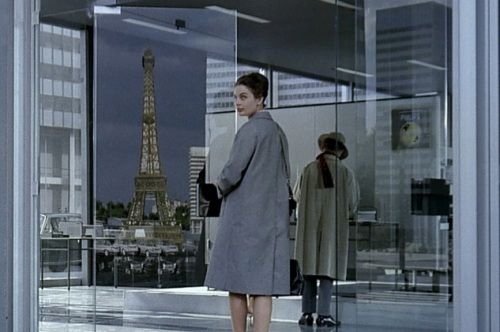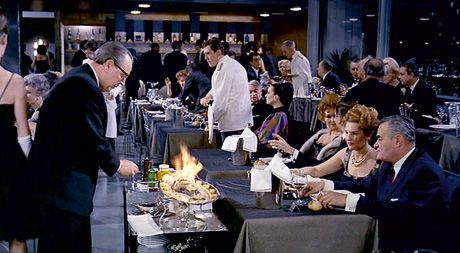Sunday, September 16, 2012
Playtime
Playtime
1967
Director: Jacques Tati
Starring: Jacques Tati and his sets
Director Jacques Tati’s third film starring his own character Monsieur Hulot, Playtime is a significant deviation from the previous two Hulot comedies. It takes on larger issues and is, in my opinion, darker and bleaker. Less about the individual than society as a whole, the film is also nothing short of a visual treat, essentially being two hours of nonstop sight gags.
The story, which is very limited and not the focus, centers somewhat around Monsieur Hulot (Tati) as he finds himself in the big city, ultimately revealed to be Paris. Everything is sleek, modern, and technological to the point of utter absurdity. In an office building, Hulot tries to navigate his way around. At night, he gets invited into the modern home of an old friend. We then spend an extended sequence at a nightclub that has just opened up where nothing is quite yet working. The film concludes with a carnival sequence.
While Playtime is a comedy, it’s more a comedy because it’s not a drama. I don’t think I laughed out loud once while watching it, but it made me smile several times. The jokes are all visual; the film is essentially silent, as very little of the dialogue is important. Save for a few rather fun sound effects, you could watch this on mute and still get the same effect. This is certainly a movie to SEE. Tati shot Playtime in 70 mm, and he packs the screen full of interesting tidbits, carefully avoiding the close-up in favor of long-shot after long-shot packed to the gills with details. I watched this on our huge flatscreen television, and I still found my eyes constantly roving all over the screen, noticing little tiny jokes or sets. When you find one, it makes you smile. The janitor who has trouble finding anything to clean in the utterly sterile airport was the first little gag I enjoyed, the constant appearance of the generic black office chair in waiting rooms, conference rooms, living rooms, and restaurants was another, and the carnival rides at the end close up the gentle comedy nicely.
Tati built the entire set from the ground up, something which I still can’t quite wrap my head around. I don’t doubt that’s true, but at the same time, I can’t believe this wasn’t shot on location in an office building. This is a huge film in terms of production; all the buildings, all the streets, all the traffic lights, all of it was made just for this. Wow.
While rewatching Playtime, I couldn’t help but think back to the previous two M. Hulot films, Les Vacances de M. Hulot and Mon Oncle. In Les Vacances, M. Hulot goes to a seaside resort, meets a few interesting people, and Chaplin-esque antics ensue. In Mon Oncle, Hulot is the titular uncle who visits the house of his family that is filled with modern contraptions. That film’s driving force is bumbling Hulot versus said contraptions. Hulot is front and center in both of these films. In Playtime, however, we see far less of Hulot; indeed, Tati even teases us with several faux Hulots throughout the film, men dressed like the Hulot character but who are clearly not him. Hulot really needn’t have been in Playtime at all, save for making the connection between this movie and the previous two. I find that very significant. Tati has turned our attention from the individual bumbling clown to much larger issues. The size of the cast changes between the early films and this one as well. The previous two Hulot films feel downright insulated compared to the sprawling landscape of Playtime. Les Vacances, based on what I remember, has a cast of maybe a dozen or so, and Mon Oncle is smaller yet with only four significant characters, but Playtime is huge. Literally, hundreds of people populate the world Tati has built, and while we see maybe about a half dozen characters with some regularity, we don’t see them terribly often and we are constantly being exposed to new people. In my opinion, this is what Tati wanted to do; change the focus from the single character to society as a whole. While in Mon Oncle, we get our laughs from the bumbling clown’s inability to deal with modern technology, Tati is actively condemning all of society in Playtime for losing its soul. We are too dependent on that technology, Tati screams from his heart, and it has stripped us of who we are. What good is it to visit Paris if it looks exactly the same as all other cities around the world? His extras move with frightening precision and uniformity, clicking their heels as they march down gleaming and soulless airport halls.
Having said all of that, Tati tempers his anger in the final third of the film, the extended restaurant sequence followed by the carnival finale. In the restaurant scene, everything that could go wrong on opening night happens, but instead of guests being angry about it, they have a better and better time, becoming less and less inhibited as the night gets progressively more chaotic. Tati believes there is hope for us yet, we just need to break loose from the shackles of too much conformity. The final carnival sequence takes us back to the same sterile cityscape we have seen throughout the film, but instead of being painted entirely in the drab grays of the first half of the film, colors are introduced in the form of streamers, flowers, and balloons. All the technology becomes joyously inane.
Among the myriad of things going on in Playtime is the occasional filmic reference by Tati, in the subtlest possible ways. I picked up on very clear references to both The Gold Rush and Breathless, and general James Dean references as well in the form of several young men on the street in fifties get-ups, greased-back hair, sour demeanors and hunched shoulders. The Gold Rush reference was so quiet, I had to rewind the scene to realize if I had just seen what I thought I saw, but it’s brilliantly done. A travel agent at a counter sits on a stool that rolls back and forth. As he deals with the crush of customers at the counter, he rolls his stool the length of the counter; when seen from behind, his feet do the “forks and dinner rolls” classic Chaplin sequence from that movie. Later, a young man suddenly walks into a building in a yellow t-shirt and rolled-up jeans, hawking “Herald Tribune!” If that isn’t Breathless, I’ll eat my hat. Even in a brief scene, a sickly green gets cast over everyone due to a neon sign, and I thought of Vertigo. I always get a kick out of finding these little references in one film about others; it illustrates so clearly a director’s love of films, and I love it when the director is a film fan too.
In a very strange way, Playtime feels like one of the angriest comedies I’ve ever seen. Tati makes his point very clearly to me, and I constantly felt him rage against modern culture that has, in his opinion, lost its way. He keeps the film from getting too down, though, by ending on an uplifting note. ‘This is what we might become,’ he seems to be saying. ‘Don’t lose touch with the child inside, or this will be our fate.’
Arbitrary Rating: 8/10.
Labels:
1001 movies,
1960s,
1967,
8 out of 10,
foreign,
french,
playtime,
tati
Subscribe to:
Post Comments (Atom)




Okay, a little disappointed nobody else has commented yet, so I'll go ahead. This was my pick for the club, and I'm glad you enjoyed it; there's just so much packed into every frame of this film that you can't help but want to see it again after it's over, and I absolutely love movies you can watch over and over again and still be entertained by it. I like how each review I've read for this so far has had their own interpretation of the film and its various messages that may or may not be hardwired into the chemistry of Tati's work; I watched the film as a pure comedy, without delving too deeply into the social or moral platitudes of it, and I still enjoyed it immensely. I'm glad that other people, from what I've gathered so far, have enjoyed it as well.
ReplyDeleteThe first time I saw it, years ago, I think I *did* read it as pure comedy. But this second time around... I dunno, there was such rage laid within the gentle comedy.
DeleteI am a HUGE fan of rewatching films (many times over, if they're my favorites), so I also really appreciate films that keep on giving you something new the more you see them. This DEFINITELY fits in that category. It's got a lot of depth, that's for sure!